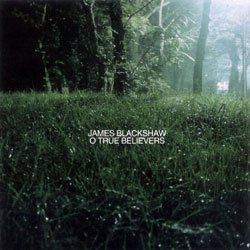
The personal curiosity of listening to James Blackshaw, the English guitarist who has been gradually building a considerable reputation in recent times, derived from two factors: the collaboration and friendship with Peter Wright whose drones constitute a fundamental presence in this writer's life and the use of 12 strings, a field of exploration that warrants a substantial range of acoustic shades for self-expression. Having been overwhelmed by a swarm of unanimous accolades for this artist's work, the expectations for this private meeting were quite high.
O True Believers was originally published in 2006 on Bo'Weavil. It consists of four tracks where the protagonist plays in the CECECD open tuning, which remains unchanged throughout. This already denotes the kind of environment raga, in a word generated by this musician who at first lets the strings resonate after strumming slowly as to establish the main tonality, then starts continuous arpeggios, designing undemanding patterns and straightforward fingerings that sound extremely easy to the ears. Once the groove is developed, Blackshaw stays there for long occasionally too long, if you ask me with only minor melodic variations, always in the realm of total comprehensibility. You won't find a faint trace of dissonance by searching with a lantern. In the title track he adds percussion and harmonium, elsewhere the guitar is complemented by a tamboura. Everything India-perfumed, just perfect, no surprises.
Sure, in a world like the one we're living in there's obviously a strong need of spirituality, and this young man is definitely sincere. Analyzing the record detachedly, though, I feel that the comparisons read everywhere Basho, Fahey, Kottke, you get the picture are a tad exaggerated. Blackshaw is positively gifted with a hearty touch and his inner drive makes me appreciate the effort. Still, all those odes to transcendence are excessive: this stuff is very simple, often gently engaging, yet not overly deep and at times a bit boring. The critical derision and the accusations of superficiality directed to certain Windham Hill recordings in the 80s are vividly recalled here; but artists such as Michael Hedges or William Ackerman were better guitarists, and ultimately better composers. At that time they were thrown in the New Age cauldron and disparaged by the musical intelligentsia. What will journalists write of James Blackshaw twenty years from now?
Not willing to be rude. But if this release is considered a highlight and many people seem to think so by surfing the web then it means that we've come to a point in which all that is unproblematic to digest is enough to have the masses ready to fly. Which is the same principle at the basis of commercial pop music. Sticking holy labels on a product, or lighting an incense stick while enjoying it, does not transform appearance into substance. The pessimistic observer feels that actual profundity is expressed differently, and that before pronouncing the name "John Fahey" a lot of so-called critics should rinse their mouth first, then listen to those albums carefully which I'm not sure they did.
Comments and Feedback:
|



